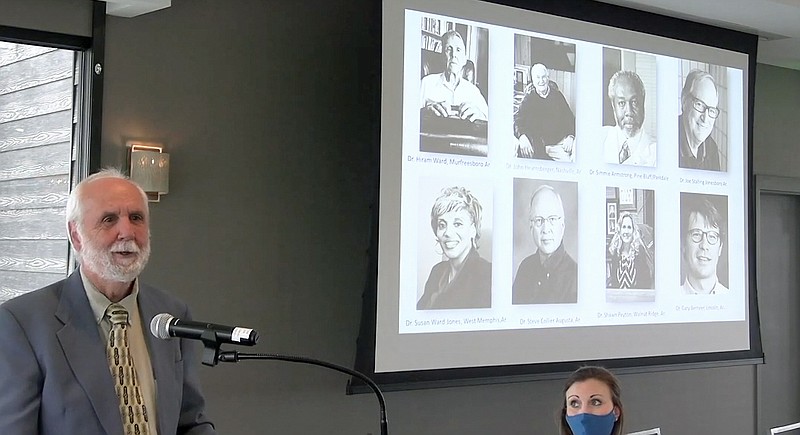Country doctors are the "quiet in the middle of the storm" for their patients, according to author and physician Dr. Sam Taggart.
Taggart, who spoke earlier this week to Hot Springs National Park Rotary Club, should know -- a country doctor himself, he has interviewed dozens over the years and recently released a book, "Country Doctors of Arkansas."
The book began as a series of interviews, recorded from 2016 to 2017, looking at the lives and practices of the country doctors of Arkansas over the last 70 years.
Taggart said the idea for the book occurred to him while he was writing "The Public's Health" in 2012.
"There are an awful lot of health care workers who labor away in relative obscurity, known only by their patients and a few colleagues," he said.
"My wife and I, and a friend of ours, created the Arkansas Physician's Oral History Project," a nonprofit organization, he told the Rotarians on Wednesday at the DoubleTree by Hilton Hot Springs. "We go out into small towns that have only 2,500 to 5,000 (residents) and interview these guys. We interviewed about 60. The oldest was 96 and the youngest was 34."
To create a representative sample of physicians involved in rural health in Arkansas over the half-century, the project focused on small towns or slightly larger towns in rural areas, covering all four corners of the state.
Video not playing? Click here https://www.youtube.com/embed/WggDjh5uX4U
"The question arises when you start to say who were these people? Who were the first country doctors of Arkansas?" Taggart said.
"We have it on pretty good authority now that there were human beings wandering this place we call Arkansas ... on a high bank on the Cash River west of Jonesboro known as the Sloan site. There are burials there and we know over a series of millennia ... I don't mean a hundred years ... millennia, thousands of years, these people developed part of their pharmacopoeia was miracle waters," he said.
"In 1935, there was a study done by chemical engineers. They demonstrated and documented 365 different mineral springs in the state of Arkansas. These people used these waters, they used the muds, they used the salts out of the Saline River. They used all these things to help heal people."
Taggart said that later on in the early 19th century, "Not all the people who served as doctors were doctors. They were called domestic medicine. Women did a lot for their families and their neighbors." In Taggart's book, he calls them "Granny Doctors." Midwives were a valuable asset for the community.
"There are characteristics of country doctors. The people in small towns and the countryside trusted their doctors. Country doctors may not be wise ... I can say that 'cause I'm one of them," Taggart joked. "But the people who live in the towns, think of them as some of the smartest, wisest people they ever met. They think of them in terms of their wisdom. They don't have all the equipment that these other people do, but they can make decisions and they can help me know when I need to go somewhere else and get taken care of."
One example of a trusted country doctor was Dr. John William Morris. "He practiced medicine until he was 102. On his hundredth birthday, the town of McCrory gave him a birthday party. He went back to his office and saw 29 patients after that," Taggart said.
Country doctors, in general, are "there from that first gasping half breath of life," he said, "until the other half of that breath ... that sigh at the end of life. They are not defined by what your sex is. They are not defined by whether you are a kid or an old person. They are not defined by what disease state you have. They are simply there to take care of patients. That's their job. That's what they do.
"The country doctor is the quiet in the middle of the storm. Most of them have a quiet voice, most of them have a warm smile, and a soft touch. These guys are the narrator of the community's story, they are the father confessor, they are the priests of technology. People show up at the office and say, 'Should I have this kind of scan?' This person is the one who helps interpret whether that scan, whether that medicine is appropriate for them. Part of the country doctor's job is to be the priest of technology."
Taggart said, "There are four or five families in the state of Arkansas who have a lineage going back to the 19th century," including Dr. Frank Thibault, who has the longest direct lineage of doctors in Arkansas.
